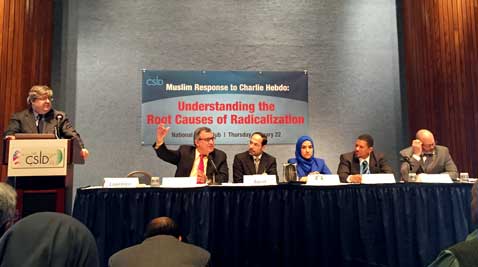
WASHINGTON–Although the First Amendment grants Americans the freedom to say what they want, some things may be better left unsaid, a panelist in a discussion about reaction to the bloody attack at Charlie Hebdo headquarters said Thursday.
“The question isn’t can we? The question is should we?” Dalia Mogahed, former Executive Director of the Gallup Center for Muslim Studies and adviser to the White House on issues related to Islam, said at the National Press Club.
Charlie Hebdo, a French satirical magazine published a cartoon mocking the prophet Mohammed. In response, two Muslim gunmen shot and killed 12 people on Jan. 7.
The top of the Charlie Hebdo website reads, “Freedom of expression is a fundamental right.”
However, Mogahed said, “We have as a society decided collectively that certain things will not be said, not because it’s illegal but because it’s immoral.”
As an example, Mogahed noted that when Americans see offensive cartoons depicting African Americans created 70-80 years ago, they cringe—not because it is illegal, but because it is no longer acceptable in today’s society.
Mogahed said the French cartoon of the prophet does not offend her as a Muslim. “I’m simply disgusted as an American,” she said.
She views the cartoon in the same light as old cartoons of African Americans. “I just wish the French would hurry up and join the rest of the world,” Mogahed said.
Another panelist, Talib Shareef, imam of The Nation’s Mosque in Washington, read his response to the attack out of the Muslim Journal and followed it by reminding the audience, “Without free press there would be no Muslim Journal.”
But Shareef expressed concern over the “I am Charlie Hebdo” movement, which involves tweets, shirts and signs at protests with this phrase demonstrating support for the magazine.
The movement allows people to believe it is OK to disrespect and offend others when in reality, this separates society, Shareef said.
Thursday’s discussion was sponsored by the Center for the Study of Islam and Democracy. Other panelists were Nihad Awad, the executive director of the Council on American-Islamic Relations, James Le Sueur, a professor at the University of Nebraska and Radwan Masmoudi, the founding president of the CSID.


You must be logged in to post a comment.